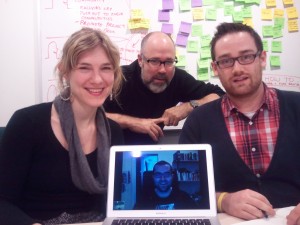So I flew up to snowy Toronto to spend all day yesterday at Mozilla’s offices in a design sprint for our Learning, Freedom and the Web book. I’d never been part of a “design sprint” before so I didn’t really know what to expect, but luckily our awesome designer Chris Appleton took charge and it turned out to be really fun and productive to boot! Basically we spent the entire day going over each page of the manuscript from a conceptual to a nuts and bolts level–identifying key concepts, looking at the Flickr pool for ideas, and sacrificing many Post-it notes in the process. Here’s some of our take-homes:
- Learning, Freedom, and the Web is about verbs, not nouns; solutions, not problems.
- We think there’s a huge silent (or not-so-silent) majority of educators out there who see the need for these kinds of changes in the world of education. We’d love for this book to be a rallying cry–a “hallway-waver” in Mark Surman’s words, something that people hold up to say “This is what I have been talking about!”
- With that in mind, a major recurring feature of each chapter is going to be how-tos. We won’t just explain the Badge Lab; we’ll give a few steps to show you how to get students to award badges in your classroom. Some DIY inspiration: Make Magazine, Instructables, Epicurious, and Fifty Dangerous Things You Should Let Your Children Do.
There’s also going to be a meta-how-to element where we explain how to put a Drumbeat-style festival together.
What do you think about the How-To idea? What needs to be included to make this actually useful?
I want to thank everyone from the community who’s provided feedback so far, and to let you know that there are two upcoming opportunities to get involved.
- We’ll be having community design/edit sprint phone calls on Thurs Feb. 3 and Thurs Feb. 24 at 7 pm ET. We’ll be going over specific chapters in each call, TBA. If your project or group is represented, we’d especially like to get your feedback/buy-in and we’ll be reaching out to you. Ben Moskowitz is in the process of putting the manuscript up on a public Etherpad, so anyone can check it out at any time.
- Right now: Nominate images for inclusion in the book! Go to this Etherpad and add links from Flickr or blogs to images you like, or email me with files.



Great idea Anya.. I wonder if you could tap into existing projects like WikiHow and others somehow. If you settle on a style guide, (I really like the SuperGlue example you show), then people could follow that guide or template and you could focus on encouraging a crowd to contribute. You might end up with How-tos you might never have imagined. I’d say you will end up with such. Critical is an easy to follow template. You might want to follow up on some with graphic design, to tie the best together.
Leigh, thanks! What a great suggestion! I’ll run it by the rest of the team…
Building on Leigh’s comment, to be of real value over the longer-term it would be really great if the book had a “wiki-compliment” to it that allowed the “how to’s” to be expanded and added to over time. One of my frustrations some times is reading books of this nature 2-3 years after they come up and finding that some of the things are already out of date, references/links not valid or new resources have surfaced that might be better to use then what was there when the book came out.
Last, I like the idea of a “hallway waiver” but to really drive change I think it needs to be our provosts, deans, and presidents who are the ones doing the waiving, not just faculty/educators. I’d try and have “how to’s” that are not just about grassroots bottom-up “things” to do but also strategic game changing “how to’s” that senior leadership can follow to drive change.
Josh, interesting point. You know, I talk to provosts/deans/presidents all the time, and they swear up and down that it’s actually the faculty who are resistant to change…I think within every group there are people who see what’s coming and others who don’t.
In terms of giving them strategies, one how-to we’re thinking of including is how-to have your own Drumbeat-style festival. Could you see institutions across the country gathering folks from within their orbit–students included–who have different skills for two days of brainstorming and hacking on solutions?
I came to your blog through a series of steps beginning with reading an article in Independent School magazine published by NAIS (Winter 2011).
I am interested in your views about educational reform and the impact of digital wave on youth’s educational capability and the development of their self-efficacy.
I too hear this often (faculty are the problem that is)…and I in general agree (stressing the “in general here) but also believe that this has, to some degree, become an easy out for high ed leadership. Why can’t they lead real change in high ed? Because the faculty won’t let them…so why even try? But in reality I think they are often as resistant to change as the faculty (hey, they were faculty once right!). Given them tools to introduce change within the shared governance model that most work in might be one way to move things forward.
I do really like the idea of providing suggestions on how to create their own Drumbeat-style festival…if this could be positioned as a way for them to start a grassroots “bottom up” change process that started with faculty that could be even more powerful. Meaning, if let’s say a Provost was able to seed and support a grassroots faculty-lead Drumbeat festival that engaged students as well that could really move things forward. Instead of forcing change on the faculty they would simply be supporting faculty who were pushing for it.